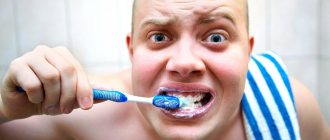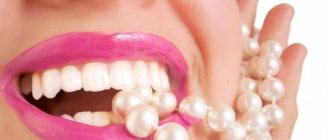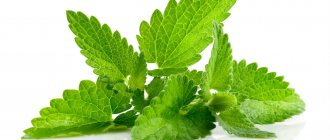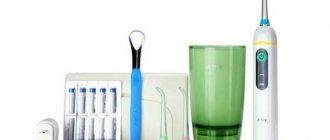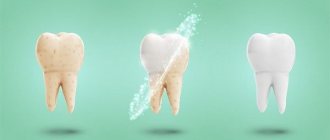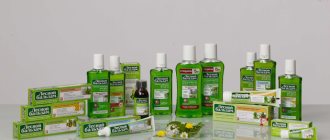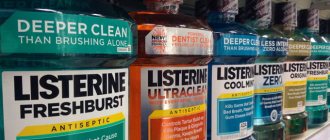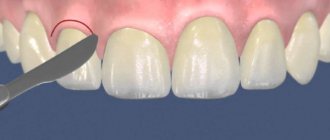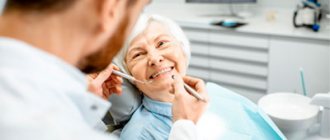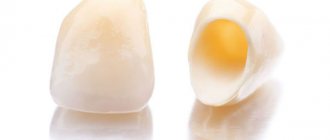You do this every day, ideally more than once a day, and you are so used to this procedure that you no longer think about how correctly you brush your teeth. Or perhaps you are simply convinced that you are definitely brushing your teeth correctly, since it is impossible to do it incorrectly. Let's compare your knowledge and habits with the recommendations of the dentists of our clinic, perhaps you will learn something new about your usual ritual.
What does proper oral hygiene give us?
- Prevention of caries.
Microbes and food particles stuck in the interdental spaces negatively affect the enamel, gradually destroying it. - Elimination of unpleasant odor.
The gases released by bacteria have a very unpleasant odor. In addition, food particles remaining in the mouth begin to decompose over time. As a result, bad breath appears, and thorough brushing of teeth perfectly freshens breath. - Remineralization of enamel.
Using strengthening toothpastes with a mineralizing effect will help strengthen the enamel and make teeth less susceptible to acid attack. - Healing and soft tissue massage.
The stability of teeth directly depends on the condition of the gums, and daily brushing prevents inflammatory processes in soft tissues and improves the overall condition of the oral cavity. - Prevention of diseases.
Microorganisms living in the oral cavity can cause ENT diseases, such as tonsillitis. Poor hygiene will contribute to this.
Eating vegetables
summerhillmarket.com
Oddly enough, some dentists recommend eating crunchy vegetables instead of regular brushing.
“Fibrous vegetables can act like a brush. When you eat them, biting and chewing can remove food particles and clean your teeth, explain experts at Grace & Leedy Dentistry
In particular, you can use a celery stalk as an alternative toothbrush. You can either simply eat it (if you don’t have toothpaste), or after biting it, tear off the edge and use the stem as a natural toothbrush, applying toothpaste to it.
Why brush your teeth at night
At night, the human body rests, and its main systems go into “sleep” mode. The salivary gland is no exception, which is why in the morning we feel dry mouth and a great desire to drink. This happens because during sleep, saliva is practically not secreted, which means it does not perform its important functions:
- does not wash away food particles and bacteria from the surface of the teeth
- does not help regulate the pH level (acid-base balance) in the mouth
Didn't you brush your teeth before bed? This means that they are left with plaque accumulated during the day, food particles, as well as microorganisms that will happily feed on them until the morning. In such a comfortable environment, colonies of bacteria will quickly form. All night long they will release acids that destroy enamel, as well as gases, which cause bad breath in the morning. All this can be avoided by brushing your teeth thoroughly after your last meal.
If you have to choose between mandatory brushing of your teeth in the morning or before bed, then give preference to the latter option. During the day, saliva, solid foods and water will help you cope with plaque and bacteria, but at night your teeth become defenseless.
Teeth whitening methods
With the help of berries
Berries, in particular strawberries and wild strawberries, can not only be eaten, added to a pie or made into jam, but also used to whiten teeth. Both the juice and pulp of strawberries or strawberries can be used as a bleaching material. You need to rinse your mouth with the juice and then rub your teeth with the pulp.
Pros: An environmentally friendly and quite tasty way to whiten your teeth at home.
Disadvantages: however, do not forget that the juice of strawberries and wild strawberries contains acid, which corrodes the enamel of the teeth, so after this method of whitening you need to brush them with toothpaste.
Using an infusion of birch leaves
Pour boiling water over half a glass of birch leaves and let it brew for 20-25 minutes. At least 2 times a day, using a toothbrush soaked in this infusion, brush your teeth for 3 minutes.
Pros: environmentally friendly, completely free and easily accessible way to whiten your teeth at home.
Cons: the infusion contains substances that corrode tooth enamel, so after brushing you must rinse your mouth with water. In addition, whitening will not happen too quickly: the effect will be noticeable in a month at best.
Whitening with soda
You can rub your teeth with a cotton swab dipped in baking soda. You can also fill gauze with it and rub your teeth with a gauze swab - since the surface of the swab will be rough, the cleansing effect will be better. In addition, you can also rinse your mouth with baking soda.
Pros: teeth whitening this way will soon give quite noticeable results, in addition, this method is not at all expensive.
Cons: it is important to know that soda corrodes and thins the enamel of teeth, so frequent whitening with it will be very dangerous. Also, soda has a bad effect on the mucous membranes of the oral cavity and reduces acidity.
Using tree resin
You need to brush your teeth with it using a brush. Potassium hydroxide contained in the resin will promote bleaching.
Pros: environmentally friendly material that will help whiten your teeth at home quite quickly.
Cons: Tree resin cannot be used frequently. With prolonged use, it can damage the enamel and gums.
Whitening with activated carbon
Mash the activated carbon thoroughly to form a powder and apply to a wet brush. Whiten for 2-3 minutes, then rinse your mouth and brush your teeth again, this time with toothpaste.
Pros: this teeth whitening system is easily accessible, because activated carbon is available in any pharmacy and is quite inexpensive.
Cons: this method is not suitable for those who set out to whiten their teeth in the shortest possible time. In addition, if the activated carbon is not crushed well enough, you risk scratching your teeth enamel.
Using whitening pastes
This is the least hassle-free way to whiten your teeth at home. There is no need to grind, rub or insist on anything: just apply the whitening paste to the brush and clean the surface of the teeth. Your dentist will help you decide on the choice of whitening paste.
Electric toothbrushes are more effective than manual ones
Pros: Teeth whitening methods that use whitening pastes are the safest for tooth enamel.
Disadvantages: this is an ineffective method, and this type of whitening cannot be used for more than one month, otherwise the tooth enamel will begin to deteriorate.
Whitening gels
This is a relatively new method that will help whiten your teeth at home. To use it, consultation or assistance from a dentist is required. The doctor will help you choose the right gel and tell you how to use it for whitening. The gel can be simply applied to the surface of the teeth, or it can be whitened using a special tray, which the doctor will make from an impression taken from your own teeth.
Pros: the method is quite effective, giving visible results.
Cons: When using whitening with a tray, you need to be careful with hydrogen peroxide. It is best to carry out such whitening after consultation with a dentist.
What can happen if you brush your teeth irregularly or poorly?
- Caries will appear.
Plaque on teeth constantly attracts food particles and bacteria. If you don’t brush your teeth, microorganisms will feel so comfortable that already on the third day their number in the oral cavity will exceed the entire population of the Earth. All these bacteria will begin to secrete acids that will gradually destroy the enamel. This will allow the infection to penetrate into the tooth and tooth decay will begin. - The color of the teeth will change.
All foods, even green tea, contain dyes. Because of them, the plaque becomes pigmented, that is, stained, and the teeth darken as a result. Professional oral hygiene will help restore them to their natural shade. - Tartars form faster.
The soft film on the enamel mineralizes over time and turns into tartar. In fact, this is an inevitable process, since it is impossible to remove all plaque from the surface of each tooth even with the simultaneous use of a toothbrush, irrigator and floss. But those who brush their teeth thoroughly and regularly at home have less hard deposits and they form more slowly. - There will be a bad breath.
Microbes living in plaque emit gases with a very unpleasant odor. If you don’t remove biofilm from the surface of your teeth well, you can forget about fresh breath. - Your gums will become inflamed.
Gradually, tartar penetrates under the gums, and if they are not removed using ultrasound, then over time an inflammatory process will begin in the soft tissues - bleeding, pain and bad breath will appear. - Your teeth will become sensitive.
If you do not pay attention to gum inflammation, over time the soft tissues will cease to be elastic, they will begin to decline, and the teeth will appear longer because their roots will be exposed. At this point, you will have to exclude everything sweet, salty, sour, cold and hot from your diet, as tooth sensitivity will increase. - Teeth will lose stability.
Due to the severe inflammatory process, the tissue that holds the teeth in the socket is destroyed. They become unstable and may simply fall out over time.
Even incorrect movements when brushing your teeth and excessive pressure on the toothbrush can lead to abrasion of the enamel and the appearance of defects on it. Consult a hygienist to teach you the proper technique for brushing your teeth. This is an excellent prevention of caries and other oral diseases.
Use your finger
newsthump.com
As a last resort, just use your finger. This is the simplest, but actually effective advice from the Pennsylvania Center for Dental Implants and Periodontology.
Dentists using toothpaste and a finger is a good method for removing plaque in case of field conditions.
Simply apply a standard amount of toothpaste to your finger and rub it all over your teeth and gums as if you were actually using a toothbrush.
In this case, the following conditions must be observed:
1. Wash your hands thoroughly with soap;
2. Rinse your mouth to remove any food debris or debris.
see also
My head is splitting: how the pain can be related to teeth
Children's dental hygiene
Parents who are responsible for the health of their children are wondering how many times a day their child’s teeth should be brushed. Children's health issues should not always be approached in the same way as adult care. As soon as a child's first baby teeth emerge, it is necessary to begin caring for them. Special silicone brushes and safe pastes that can be swallowed are intended for babies. You can start hygiene once a day, gradually teaching your child to brush his teeth in the morning and evening. The cleansing process must be supervised by an adult. It is difficult for a child to carry out the correct manipulations on his own, and rarely does a child have enough patience for at least two minutes. It's worth coming up with an interesting incentive or turning daily teeth brushing into a fun game.
For young children who are just learning to brush their teeth, it is recommended to use a silicone toothbrush. The silicone from which the brush is made is soft and does not scratch gums or harm tooth enamel.
How much does it cost to brush your teeth too often?
More than twice. Dentists recommend not to get carried away with brushing your teeth for several reasons. The first is that the bristles of a toothbrush can mechanically damage the enamel, which leads to microcracks. In the future, this leads to the destruction of the tooth as a whole. Often, this happens after using a brush that is too hard. The enamel wears away, leaving the tooth even without natural protection. The second reason is that the active substances in toothpaste increase the sensitivity of the enamel, irritating the gums and mucous membranes. As a result, the gums swell and bleed more often.
If frequent brushing of your teeth is a method of getting rid of an unpleasant aftertaste after eating, then you need to get into the habit of using mouth rinse or chewing gum. Acidic foods weaken enamel—another reason to refrain from brushing your teeth frequently.
Tooth pulpitis - what is it?
Microorganisms + the toxins they release begin to penetrate into the dental pulp from the area damaged by caries. The body's response is increased blood flow in the pulp, increased pressure on the nerve fibers.
Acute pulpitis
It is characterized by acute toothache that occurs under the influence of cold/hot liquid or air. As soon as the irritant stops acting, the pain disappears. Consequences: lack of treatment leads to exacerbation of the disease and the occurrence of purulent pulpitis.
Purulent pulpitis
The disease is characterized by the presence of a purulent focus, which is located in the tooth cavity. The person begins to experience severe, unbearable pain, intensifying at night. Painful sensations are transmitted to the temporal region, ear or eye socket. Consequences: can lead to necrosis (death) of the pulp.
Chronic pulpitis
Untreated acute pulpitis leads to the development of a chronic condition. With chronic pulpitis, severe throbbing pain occurs when exposed to an irritant. As soon as the irritant goes away, the painful sensations gradually decrease. Chronic pulpitis requires prompt treatment, otherwise... Consequences : there is a high probability of a complication - periodontitis .
How to brush your teeth correctly: seven main recommendations
It is recommended to brush for about three minutes. This time is enough to remove soft plaque. It is important to follow seven recommendations.
- On the lower jaw - with a sweeping movement from the gum to the edge, from bottom to top.
- The upper jaw is cleaned from the gums to the incisors, moving from top to bottom.
- It should be cleaned both from the outside and from the inside.
- For the side surface, the brush is held at an angle of 45 degrees so that it captures two or three teeth at once.
- And for the front, as well as the inside, at an angle of 90 degrees.
- The chewing surface is cleaned with circular movements.
- After the procedure, it is recommended to use a special thread or floss to remove any remaining food in the interdental spaces.
These are the basic rules. If you follow them, the risk of developing caries is reduced. To enhance the effect, you can use a therapeutic or preventive rinse. For example, Splat, Colgate, Lacalut, Listerine.
Dentist shows how to use a brush on a toy hippo
When is professional teeth cleaning required?
Professional hygiene in the dentist’s office is usually carried out 1-2 times a year for any patient who has healthy teeth and takes sufficient care of them. People who are addicted to smoking or who abuse sweet foods, strong tea, wine or coffee may need to have their teeth professionally cleaned of plaque every 3 months. Sometimes a doctor prescribes unscheduled cleaning before installing braces, treating caries, or installing prosthetic structures.
Sources:
- https://www.PravChelny.ru/useful/?ID=661
- https://ZubNeBoley.ru/gigiena/pravilnaya-chistka-zubov-do-zavtraka-ili-posle/
- https://StomaGet.ru/gigiena/skolko-nado-chistit-zuby
- https://zen.yandex.com/media/id/5dedc50d0be00a00b1abf3b5/skolko-raz-chistit-zuby-delat-eto-do-ili-posle-edy-i-kak-dolgo-5e1807991febd400ae3b54ea?feed_exp=ordinary_feed&from=channel&rid= 348790507.441.1584804369101.80599&integration=publishers_platform_yandex&secdata=CIjipJT8LSABMAJQDw%3D%3D
- https://nujnoli.ru/nuzhno-li-chistit-zuby-dva-raza-v-den/
- https://ZubNeBoley.ru/gigiena/otbelivanie-i-chistka/skolko-raz-v-den-nado-chistit-zuby/
- https://zen.yandex.ru/media/id/595f771257906a9cc714b1cb/5c1b856e71aad100a9e2d991
- https://dentamed.club/gigiena/chistka/skolko-raz-v-den-chist-zub.html
Should I use mouth rinses?
No, unless there is a doctor's testimony. Rinse aids eliminate unpleasant odors and help fight plaque, but they are not needed for everyday hygiene. And you definitely shouldn't overuse them: a recent Harvard University study found that antibacterial mouthwashes kill good bacteria in your mouth and, if used more than twice a day, increase the risk of developing diabetes.
This is interesting: Coating teeth with fluoride varnish - what is it, price, reviews, before and after photos
